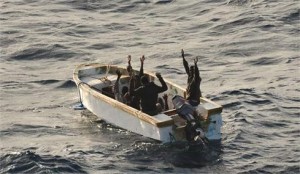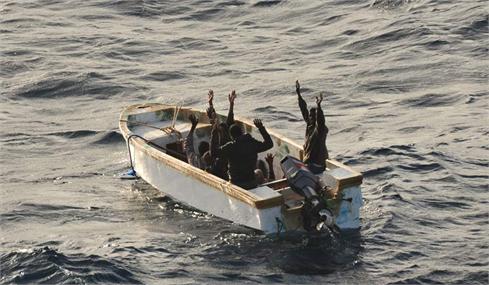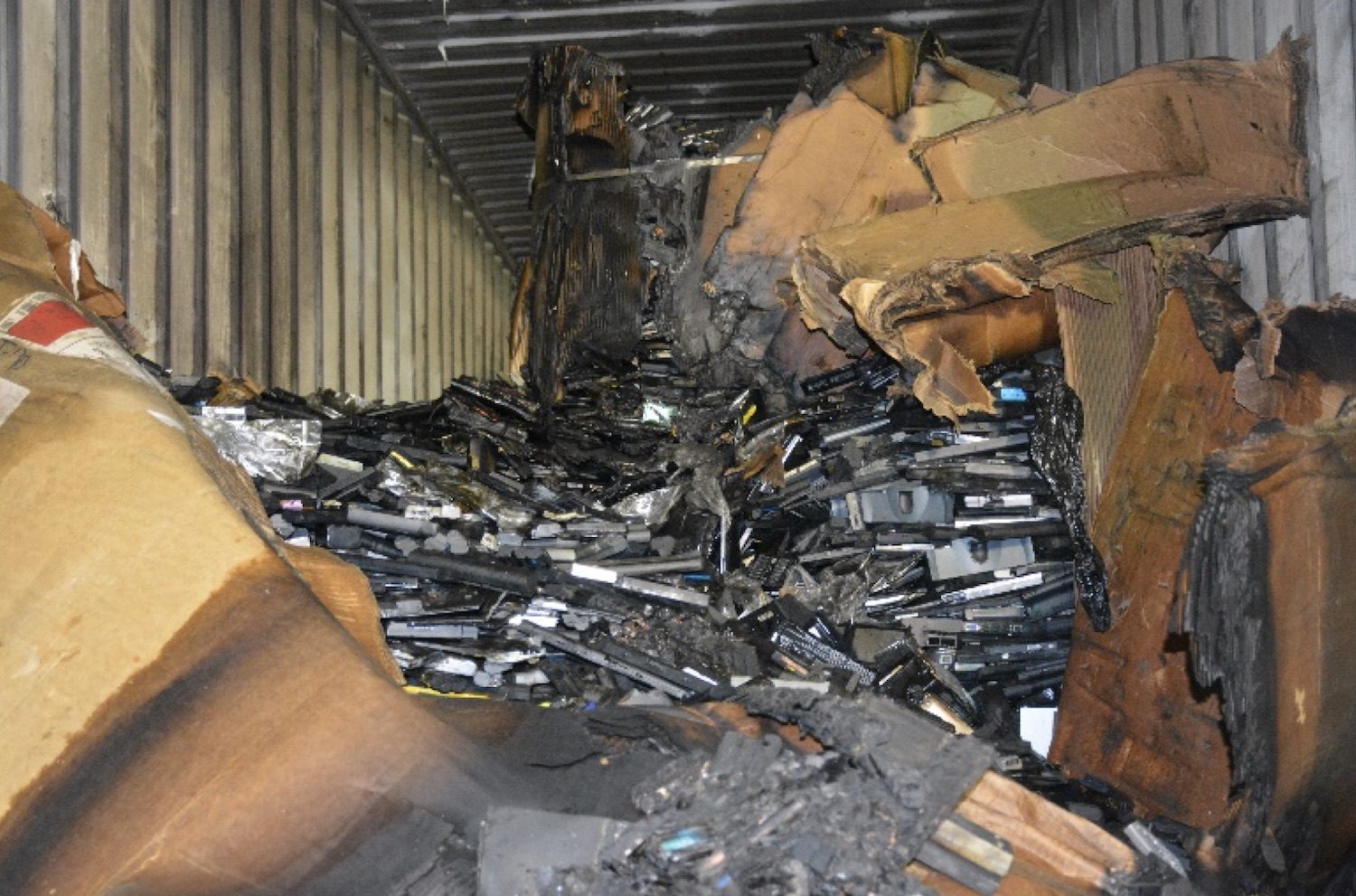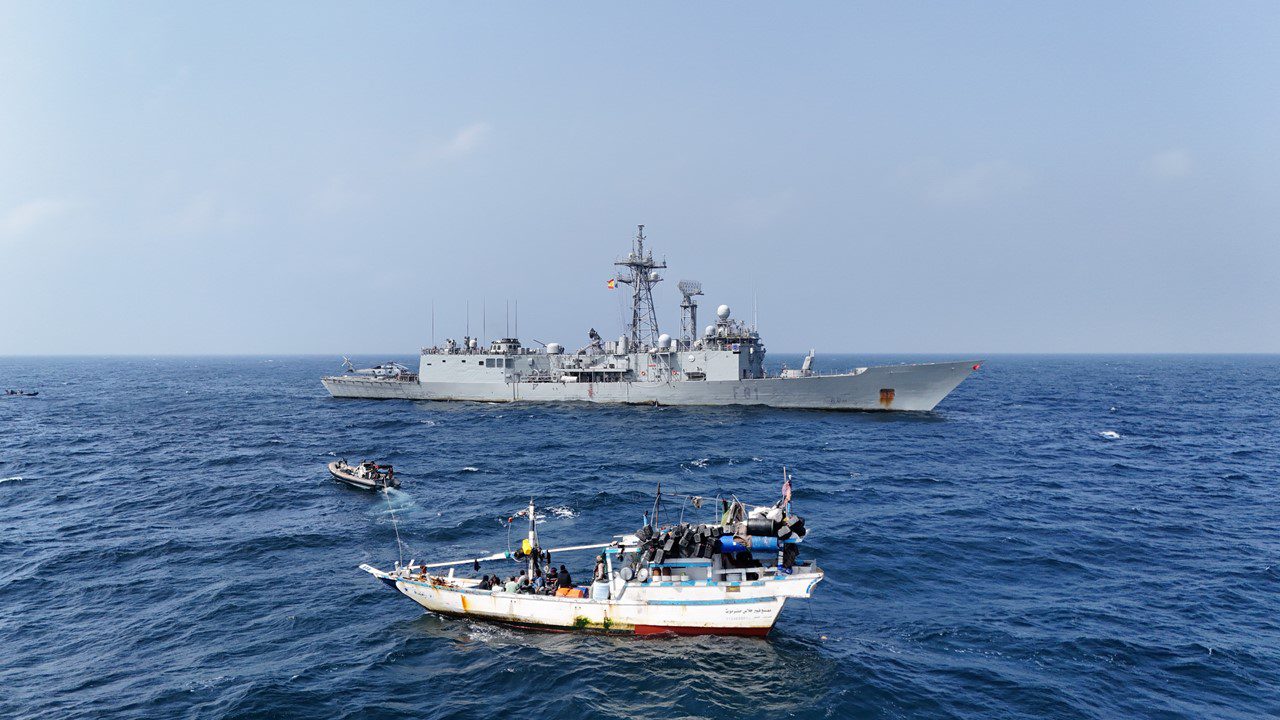 Herdon, Virginia — U.S. Navy Rear Admiral (Ret.) Terence E. “Terry” McKnight, the pioneering U.S. Commander of Task Force 151 off the coast of Somali and the author of the new book, Pirate Alley, has warned in an interview that caution ought to temper demands that—because piracy has declined somewhat in the Gulf of Aden and other places—the unique coalition of countries’ navies now be withdrawn.
Herdon, Virginia — U.S. Navy Rear Admiral (Ret.) Terence E. “Terry” McKnight, the pioneering U.S. Commander of Task Force 151 off the coast of Somali and the author of the new book, Pirate Alley, has warned in an interview that caution ought to temper demands that—because piracy has declined somewhat in the Gulf of Aden and other places—the unique coalition of countries’ navies now be withdrawn.
“One thing I hope does not happen is that, because piracy is on the wane, navies don’t start to pull out,” McKnight said. The potential security vacuum, he added, may not be adequately covered by still largely-unregulated private security solutions alone. “If navies start to pull out I think you will see private security teams that will not be as protective, and you will see piracy start to pick up again.
“It is private security firms, the navies and the maritime community that, working together, can bring down the number of piracies.”
McKnight was interviewed earlier this week at the offices of the Washington-based private security firm, AdvanFort, where he also shared with company executives and staff his commanding view of the challenges posed by piracy as a transnational security threat in the Gulf of Aden and increasingly in other areas of the globe.
He pointed to the fact that not only have pirates in the Gulf of Aden changed their tactics over time, seeking to outflank international control efforts, but also they have improved their range of operations—to the detriment of the free flow of commerce in a region of fundamental importance to global economic growth.
Piracy, McKnight noted, is “a money-making business and they are going to try their hardest to stay ahead of us. … They are always looking for tactics to overcome those of ours. Like anybody else, they are going to hire consultants and they are going to say, ‘How can we defeat armed security teams? How can we get better?’”
As part of that effort, he pointed out, pirates in the region adopted the use of mother ships to extend their reach, and nighttime boarding to foil ongoing security efforts.
“We thought we had the problem contained in the Gulf of Aden and then it went out into the Indian Ocean, and then it went into the region of the Seychelles. So they are going to go out there and do what it takes to hijack some of these vessels. We’ve seen them out 1,500, almost 2,000 miles, along the coast of India. If they can get the vessels and extend their reach, they’ll get out there.”
McKnight praised the role played by AdvanFort and other leaders in the private security field, saying that it was very important that not only do they work with the coalition navies that are in the field, but also that they follow the same standards of engagement used by those militaries.
“When you put a security team on a merchant vessel, how do they work with the master? Do they understand the language—is there a barrier? They have to understand those techniques so the master isn’t just throwing his hands up in the air and saying, ‘Okay, you just fire on anybody,’ without concern for human rights.”
“Most of the security teams are hiring ex-Special Forces members who are trained not only on self-defense, but security issues,” McKnight noted. “All indications are that the majority of the teams that are out there are sanctioned by the governments and have gone through some type of certification, on how they are trained and what they are trained for.”
“So it’s not live the Wild West, where it was: ‘Let’s just form a posse and grab people off the street.’ The last thing you want to do is have a company that is sending people out there who are not trained and we have an incident that would put a bad name on the maritime community” as a whole.
In the interview, conducted by veteran journalist Martin Edwin Andersen, McKnight praised the coalition navies’ role in counter-piracy, pointing to the Shared Awareness and Deconflation (SHADE) conference, hosted by the 26 partner nations of the Combined Maritime Forces, as a model for information sharing that could be extended to the merchant and private security communities.
He said that one ally in the counter-piracy effort, China—with five of the top seven commercial lines Chinese flag vessels—shares a “keen interest” the free flow of commerce.
At the same time, McKnight added, “I think we have to be cautious about what China’s goals are out there.
“Are they out there just to fight pirates, or are they out there to find how they can become a blue-water navy like we were in the early 1900s? We have to be very careful on how we deal with China.”

 Join The Club
Join The Club




 Herdon, Virginia — U.S. Navy Rear Admiral (Ret.) Terence E. “Terry” McKnight, the pioneering U.S. Commander of Task Force 151 off the coast of Somali and the author of the new book,
Herdon, Virginia — U.S. Navy Rear Admiral (Ret.) Terence E. “Terry” McKnight, the pioneering U.S. Commander of Task Force 151 off the coast of Somali and the author of the new book, 






